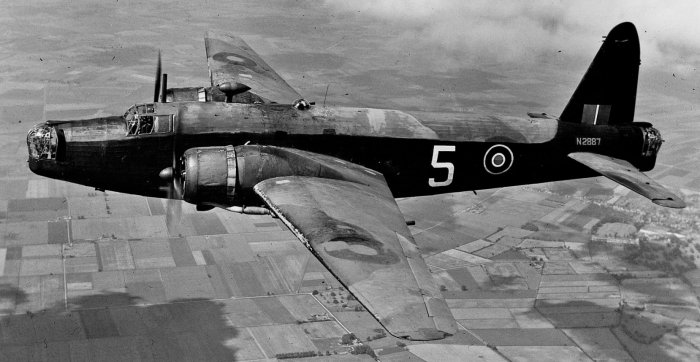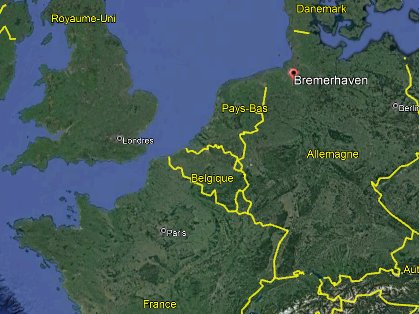ACUFO-1940-03-24-WESERMUNDE-1
In the 2020's, author Graeme Rendall, in an article published on the blog The Debrief, wrote about the Foo-Fighters reported by R.A.F. pilots during WWII.
Among the cases he wrote about, he published a scan of an R.A.F. report he said to be dated 1940, which indicates that on the night of March 24 to March 25, near Wesermünde (Germany), “two unidentified aircraft, each with what appeared to be a searchlight, shadowed our aircraft from a considerable distance astern. After about five minutes our aircraft gave a burst of 30 rounds. The enemy's lights extinguished and they were lost to sight. No attack was made on our aircraft.”
| Date: | March 24-25, 1940 |
|---|---|
| Time: | Night. |
| Duration: | 5 minutes. |
| First known report date: | 1940 |
| Reporting delay: | Hours, months. |
| Country: | Germany |
|---|---|
| State/Department: | Bremen |
| City or place: | Wesermünde |
| Number of alleged witnesses: | ? |
|---|---|
| Number of known witnesses: | 0 |
| Number of named witnesses: | 0 |
| Reporting channel: | R.A.F. report of 1940. |
|---|---|
| Visibility conditions: | Night. |
| UFO observed: | Yes. |
| UFO arrival observed: | ? |
| UFO departure observed: | Yes. |
| UFO action: | Extinguishes when fired at with 30 rounds of 7.62 machine gun. |
| Witnesses action: | Opened fire with 30 rounds of 7.62 machine gun. |
| Photographs: | No. |
| Sketch(s) by witness(es): | No. |
| Sketch(es) approved by witness(es): | No. |
| Witness(es) feelings: | ? |
| Witnesses interpretation: | Two enemy aircraft with searchlights. |
| Sensors: |
[X] Visual: 1 or more.
[ ] Airborne radar: N/A. [ ] Directional ground radar: N/A. [ ] Height finder ground radar: N/A. [ ] Photo: [ ] Film/video: [ ] EM Effects: [ ] Failures: [ ] Damages: |
|---|---|
| Hynek: | NL |
| Armed / unarmed: | Armed, 7.62 mm machines guns. |
| Reliability 1-3: | 1 |
| Strangeness 1-3: | 2 |
| ACUFO: | Possible extraterrestrial craft. |
[Ref. grl1:] GRAEME RENDALL:

|
[Transcript of the above scan:]
(b) On the night of 24th/25th March, near Wesermunde, two unidentified aircraft, each with what appeared to be a searchlight, shadowed our aircraft from a considerable distance astern. After about five minutes our aircraft gave a burst of 30 rounds. The enemy's lights extinguished and they were lost to sight. No attack was made on our aircraft.
An extract from a 1940 report detailing “unidentified aircraft” carrying “searchlights”. The Germans did not experiment with such devices and therefore the exact nature of whatever was following the bombers concerned is unknown.
What these bomber crews were seeing and reporting back in World War 2 is unknown. The Luftwaffe never deployed air-to-air mortars or missiles for use at night. They did attempt to develop various surface-to-air missiles but none ever became operational and they certainly weren't tested over the Balkans in 1944 - or western Europe in the spring of 1940. The first operational German jet fighters were flown at night in December 1944 but only in very small numbers until the end of the war, being confined to the defence of Berlin. They couldn't have accounted for the dozens of sightings throughout that year - or earlier.
[Ref. mse1:] MARCELLO SOAVE:
Cronologia di avvistamenti redatta dal dott. Domenico Pasquariello del CEIFAN (Centro di Indagine sui Fenomeni Anomali).
[...other cases...]
- 1940: an English aircraft near Wesermunde was grazed by two unknown aircraft with very powerful lights that followed it for 5 minutes without attacking him. After a 30° turn the two craft vanish.
[...other cases...]
The Vickers-Armstrongs Wellington was a British twin-engined, long-range medium bomber designed during the mid-1930s at Brooklands in Weybridge, Surrey, U-K. The Wellington was used as a night bomber in the early years of the WWII, performing as one of the principal bombers used by Bomber Command.
Its use within the Bomber Command of the R.A.F. started September 1939. It had no airborne radar before late 1944.
For its defense against the German fighter planes, it carried 7.62 mm M1919 Browning machine guns, originally 2 in nose the turret, 2 in the tail turret, 2 in waist positions.

|

|
The city of Wesermünde was an independent city in the Prussian province of Hanover, created in 1924 by the unification of the cities of Lehe and Geestemünde. The city, to which Bremerhaven belonged since 1939, was incorporated into the State of Bremen in 1947 and renamed Bremerhaven.
The German planes of 1940 indeed did have searchlights. The facts that there were two lights, that the duration was 5 minutes, and that these two lights went out when the crew opened fire, rule out a meteor.
Added to this is the fact that enemy planes were supposed to open fire on the R.A.F. bombers. As in all the so-called “Foo-Fighters” cases, this did not occur.
Two globes of “ball lightning”, is something never seen to my knowledge.
I therefore think that this case is of high strangeness.
Possible extraterrestrial craft.
* = Source is available to me.
? = Source I am told about but could not get so far. Help needed.
| Main author: | Patrick Gross |
|---|---|
| Contributors: | None |
| Reviewers: | None |
| Editor: | Patrick Gross |
| Version: | Create/changed by: | Date: | Description: |
|---|---|---|---|
| 0.1 | Patrick Gross | September 29, 2023 | Creation, [grl1]. |
| 1.0 | Patrick Gross | September 29, 2023 | First published. |
| 1.1 | Patrick Gross | April 17, 2024 | Addition [mse1]. |